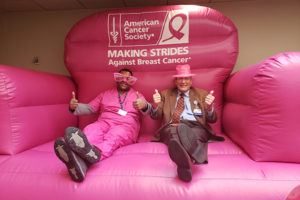Patients of Dr. Omar Khokhar can have peace of mind knowing he has personal experience to back up the medical advice he offers.
Dr. Khokhar is president of the medical staff at OSF HealthCare St. Joseph Medical Center and the lead physician at OSF Medical Group – Gastroenterology in Bloomington.
Last year, he was turning 40 and began having some gastrointestinal issues.
Some history of issues
“I’ve had intermittent bowel issues all my life – minor constipation from time to time,” Dr. Khokhar said. “Last year, I noticed the issues were a little bit different and I thought, ‘This isn’t normal.’
“I was turning 40, and in my profession, I see things happen all the time to young people,” he said. “I talked to my partner, Dr. David Rzepcynski, about what I was experiencing and decided I needed to have a colonoscopy.”
A colonoscopy is used to screen for colorectal cancer, the second leading cause of cancer-related deaths in the U.S. and the fourth most common cancer in men and women. The American Cancer Society recommends people get a colonoscopy starting at age 45.
Dr. Khokhar estimates he has performed about 12,000 colonoscopies during his career.
During a colonoscopy, the entire length of the large intestine is examined. In addition to being used as a screening tool for colon cancer, it is also used to identify inflamed tissue, ulcers and bleeding.
The finding
 On June 15, 2018, Dr. Khokhar had a colonoscopy – without anesthesia.
On June 15, 2018, Dr. Khokhar had a colonoscopy – without anesthesia.
“I wanted to have the ability to watch my own procedure and then go back to work,” he said. “Sure enough, I had a small precancerous polyp – it wasn’t causative of my bowel issues, but it would have grown to something significant if I hadn’t been proactive.
“If I had ignored my symptoms, the polyp would have continued to grow until I was within the screening age range.”
Admittedly, Dr. Khokhar said because gastroenterology is his area of expertise, he was more in tuned to what he was experiencing.
“Some may call it overkill, I call it prudent,” he said. “I didn’t want to be a ‘bad story.’”
When to get a screening
While it is recommended that people at average risk of colorectal cancer get regular screenings starting at age 45, individuals younger than that with a family history of colon cancer or who have inflammatory bowel disease should talk to their health care provider about when to begin screenings.
Family history and older age are the major risk factors for colorectal cancer. Several other factors have been associated with increased risk, too, including excessive alcohol use, obesity, being physically inactive and cigarette smoking.
People with a history of inflammatory bowel disease, such as ulcerative colitis or Crohn’s disease, also have a higher risk.
Early stages of colorectal cancer often have no symptoms. Some symptoms a person may experience, however, include blood in the stool, diarrhea, constipation or other stool issues, unexplained weight loss, regular episodes of belly pain, nausea or vomiting.
Sharing his story

Gastroenterologist Omar Khokhar and Dr. Paul Pedersen, Vice President and Chief Medical Officer, OSF HealthCare St. Joseph Medical Center at an event for the American Cancer Society.
Dr. Khokhar shares his story a couple times a week.
“I’m worried about the people out there who are ignoring their symptoms or they don’t have time or they don’t think of it as being necessary,” he said. “Abdominal pain, unintentional weight loss, blood in the stool – these things may or may not be sinister, but if you are experiencing anything like that you should discuss it with your doctor.”
March is National Colorectal Cancer Awareness Month. Colon cancer can be prevented with early detection. Screening finds polyps so they can be removed before they turn into cancer. There are several screening options available, including simple take-home options. Talk to your doctor about a screening option that’s right for you.
“If you’re above the age of 30,” Dr. Khokhar said, “see your doctor once a year and make sure you’re on top of things.”
Last Updated: January 28, 2022
